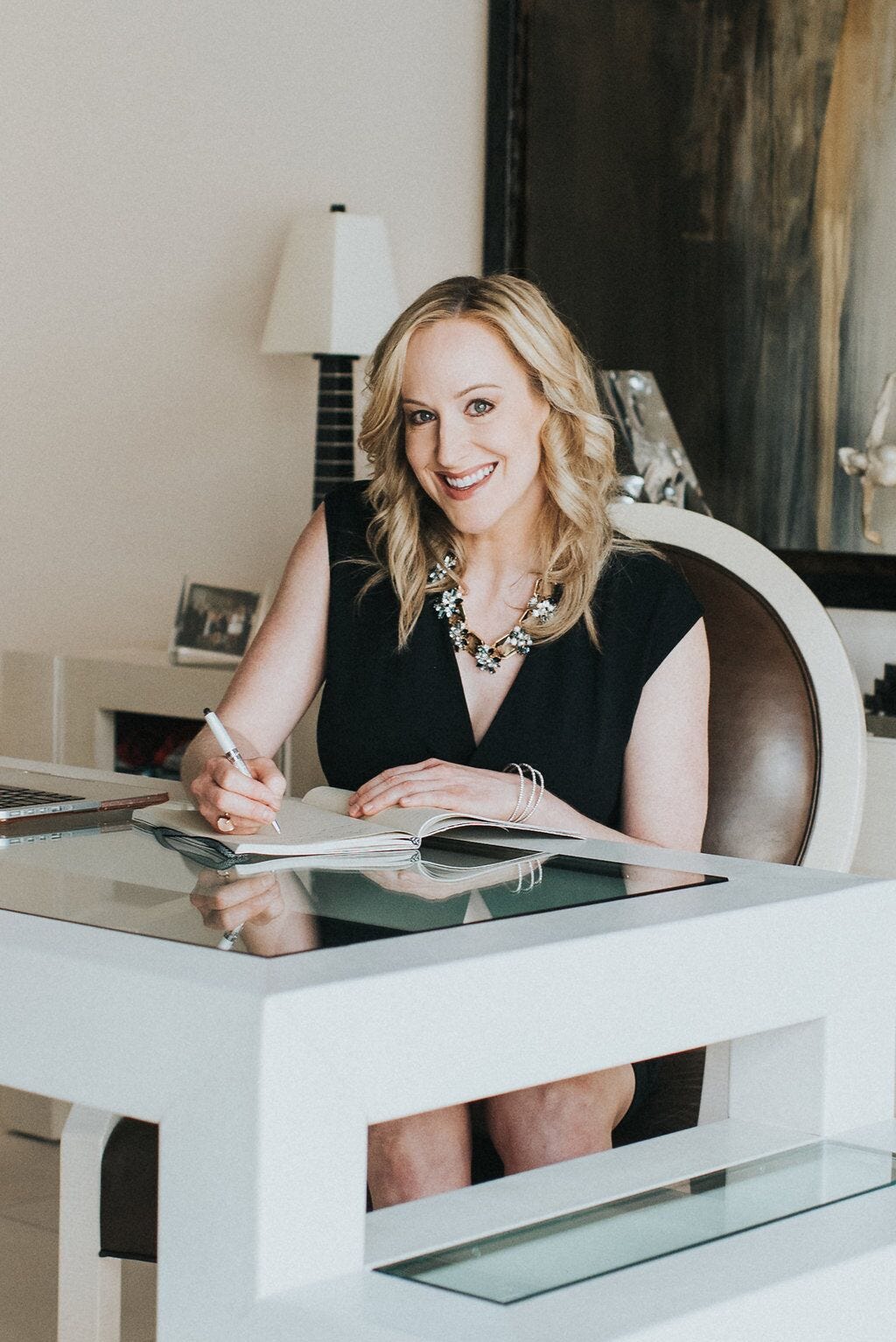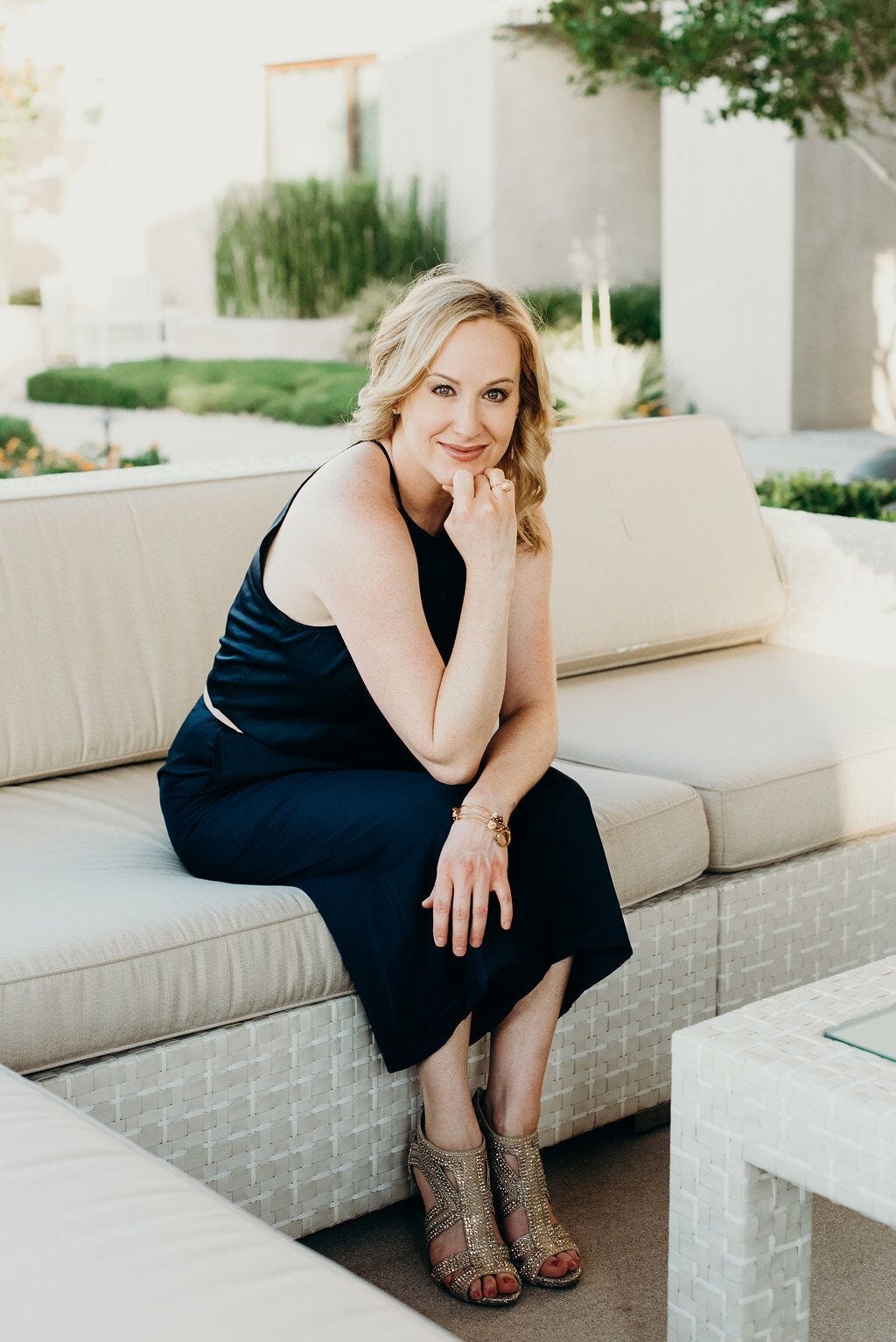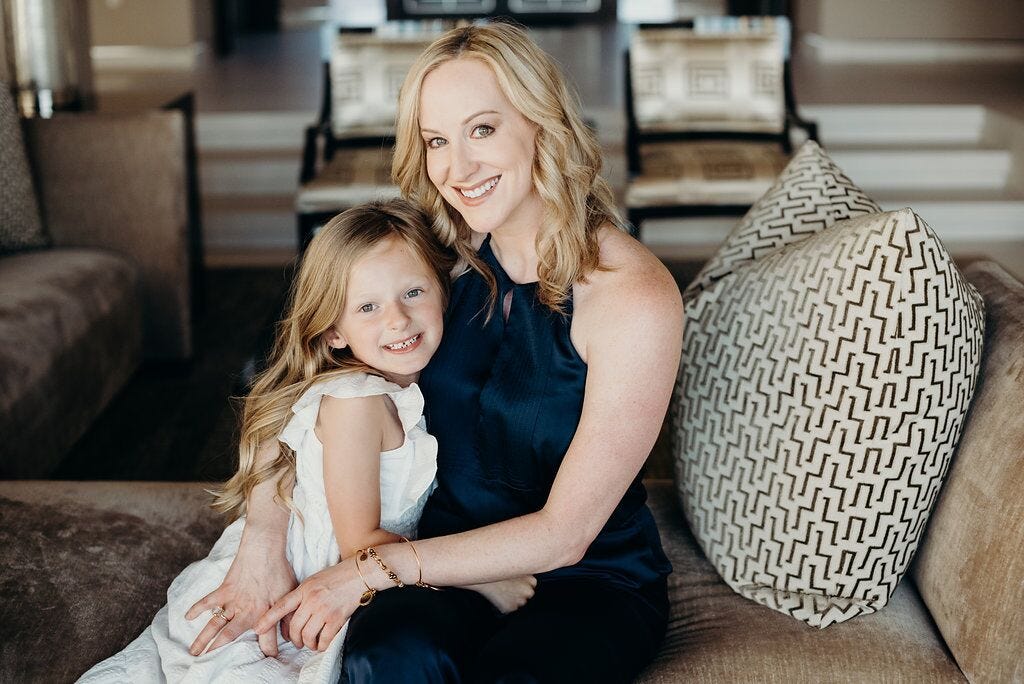Put in your time. Get words on the page. Write. Read. Network with other writers and be open to feedback. I wish I’d been more flexible and much less defensive as an aspiring author.
As part of my series about “How to write a book that sparks a movement” I had the great pleasure of interviewingJeanette Schneider.
Jeanette Schneider is an accomplished speaker, podcast hostand author of LORE: Harnessing Your Past to Create Your Future. After 23 years in finance, Jeanette retired from a highly successful career to advocate for women and girls in life, love, the boardroom and the marketplace. She is now the President and CEO of LIV Media, a network of professional women whose goal is to inspire women to change the world through a gender lens of equality, self-actualization and the fearless shattering of glass ceilings.
Can you share a story about what brought you to this particular career path?
I started writing when I was thirteen years old. A close family friend had passed from Leukemia and I had a very hard time navigating the emotions. My father handed me my very first journal and told me to write down all of the feelings I couldn’t process. That became an obsession with words and the way they made me feel. When I was a junior in high school my English teacher asked us to write a poem within three minutes. I did, and as she read it her eyes filled with tears and she sat down on the floor next to my desk. She read it aloud and then asked me to stay after class. When I walked into her office she looked at me squarely, almost challenging me, “You write.” I admitted that I did, but that it was in numerous journals and very personal, never for others. “Bring me your journals.” I still have the post it notes she papered them with and the urging to use my powerful words to move others. She said my words were not just for me. It was the first time I realized I had a gift.
Can you share the most interesting story that occurred to you in the course of your career?
I met several aspiring authors at the Backspace Writer’s Conference in New York in 2009. We imagined our books at the New York Public Library as we walked by it and made a pilgrimage to Saint Patrick’s Cathedral to pray for our literary brilliance. At the close of the trip we had dinner at a restaurant named Arno’s on 38th between Broadway and 7th, and sealed our fates by stating that whoever first was published had to pay for dinner at some future date. Tracy Brogan declared it would be her. We then closed all of our emails “See you at Arno’s” for years. Tracy was right. Her first book Crazy Little Thing came out in 2012.
That same year I was kicking off a meeting in my company boardroom (I was in finance) and one of our Trust Officers came in, “Hey, I was reading a book this weekend and I swear you were in it.” I immediately freaked out because I was clearly a terrible friend. Authors don’t tell each other that we turn you into characters or include you in Acknowledgments. We let it come out when the book does, and while I was Tracy’s beta, I had not yet read the finished version of Crazy Little Thing. Sure enough, I was a very sassy high-powered divorce attorney.
Marc Graham was the second to be published. His first book Of Ashes and Dustcame out last year and I’m thrilled to share that his second book Song of Songsdropped in April (last week). Tracy and I helped Marc with story creation in the early days of Song of Songs, which is the re-imagining of the life of Bath Sheba, also known as Makeda.
It is such a cool thing to not only to know that when you walk into a book store you will see your friend’s books, but to also have your likeness, your ideas, and your late night brainstorming sessions about Queens and the lives they may have led, turn into ink and words for others to read.
Tracy still owes us dinner.

Can you share a story about the funniest mistake you made when you were first starting?
My first book was a coming of age memoir that will never see the light of day. They say you have to burn through a book to learn how to write. I struggled with the arc of the story and it wasn’t fully baked, yet I was defiantly protective of it. I submitted a sample of it to a writer’s group, so proud of my prowess. I was a very cocky writer in my twenties and it was quickly torn to shreds. I do think the beta was a little sarcastic in her review, and I defended it (loudly) on the site. Several months later I brought up the situation (and the offender) to Marc Graham. He very delicately told me the reason no one else commented on my work was that the other members of the group had discussed it offline and realized I wasn’t open to feedback. I now think back to the way I lashed out at the beta and laugh at myself. Whether or not it is personal telling of story, if you want it to be of the world, you have to be open to the feedback, both good or bad. You really grow up and mature as a writer with each word or story. You have to put in your time. I look back at my earlier iterations and think of myself as an arrogant high school jock. Now I feel more like first level wizard.
What are some of the most interesting or exciting projects you are working on now?
I am currently writing content for a wellness app. I will never turn my back on books, and know I have more in me, but I love the accessibility technology offers. I truly feel that we look for inspiration the moment our eyes open each morning. We are searching for a reason to become, to get up, get moving, to solve for the day, and I love the idea that I can be part of that forward momentum.
What is the one habit you believe contributed the most to you becoming a great writer?
Perseverance. Even when I wasn’t paid for my writing, I did it for myself and to stay fresh. I treat writing both as an art and a business so it remains joyful, and I still use it as my creative outlet.
I also have to say that blogging (since 2009) had a huge influence on my growth as a writer, plugged me into a like-minded community and offered me a following that has remained.

Can you share the most interesting story that you shared in your book?
LORE includes a collection of love letters from successful women to their younger selves. I have often been asked what the most profound message has been and I always think to Chelli Wolford’s letter. In it, she tells her four year old self, “It’s not your fault.” She had been abandoned by her mother at 18 months, sexually abused by an uncle starting at age 4 and then gang raped her first year in the Naval Academy. It was startling to realize how early a child begins to accept responsibility for things that are not theirs to shoulder.
I recently interviewed Amberly Lago on my podcast “Gold with Jeanette Schneider” and she spoke of sexual abuse at the hands of her stepfather. Her advice to her younger self was also, “It is not your fault,” and it was the first time I made the connection between sexual abuse and the inherent and abhorrent messaging the child receives.
Each time I’ve shared Chelli’s message at a speaking engagement you can hear the air sucked out of them room and I receive private messages afterwards, “I needed to hear that.”
There are so many women who need to hear those words.
It wasn’t your fault.
What is the main empowering lesson you want your readers to take away after finishing your book?
That they have the power to create their own life. My book challenges readers to unwind old messaging and beliefs, understand how they’ve been influenced and move to a place of creation. I want my reader to close LORE with a smile on their face and say some variation of, “I’ve got this…”
What was the biggest challenge you faced in your journey to becoming a bestselling author? How did you overcome it?
Note — I am not a bestselling author
My biggest challenge was the process of becoming published. I found more of the conversations with publishers were around social media following, my personal biography and less about my book. I recently pitched a new idea to a publisher and they didn’t comment on the actual content of the book, but said, “We would’ve picked this up ten years ago, but an executive turned entrepreneur has been done.” Apparently strong, enterprising women are on the outs (who knew?), but sadly my book had nothing to do with my personal life or my career. Message missed.
As writers and creatives we spend so much time in the generation of story. When we share our baby with the “hero” who is going to bring it to the masses, it is disheartening when they first ask about your email distribution list. It really opens your eyes to the business side of publishing.
There is no clear formula for any aspiring author. I simply recommend widening your network. Go to conferences. Be open to feedback from trusted beta(s). Understand industry expectations, who is looking for what, and be ready to pitch your book 3000 times because 3001 may be your lucky number. You never know when a trend will move in your favor or the right storyline or public event will suddenly open a door.
Which literature do you draw inspiration from?
Any and all. As a girl I read all of the classics. I was immersed in historical fiction, which were followed by mysteries, coming of age memoir, self development and other non-fiction. If you were to visit my home library you would be struck by the diversity of titles. Between the pages of books I find myself, my worldview, and as I’ve become more experienced, I also learn flaws, fixes, and approach to structure. I learn something from each book I read.
As I was writing LORE I became immersed in titles surrounding Gender Lens research, conscious parenting, conflict and intimacy, choice theory and any and all self development. However, when I go on vacation, or just want to escape, I pick up a novel to get lost. My favorite books are those that I continue to think about years later. Her Fearful Symmetry by Audrey Niffenegger is one of those titles that will haunt me because of its sheer brilliance and imagination.
How do you think your writing makes an impact in the world?
There are few things in life you know in your bones that you do well. I know that when I write and when I speak I am able to make people feel. That is a truth I carry with me like a badge of honor, but also as a precious responsibility. I know that if I use my gifts with purpose, to inspire and influence, and it helps one person — they can then pay it forward. It becomes a ripple. We could end cycles. I take that very seriously.
What advice would you give to someone considering becoming an author like you?
Put in your time. Get words on the page. Write. Read. Network with other writers and be open to feedback. I wish I’d been more flexible and much less defensive as an aspiring author.

What are your “5 things I wish someone told me when I first started”?
Your writing will grow and change as you do. I went through phases where I was wordy, verbose, and used a lot of imagery to get a point across. I could write an entire paragraph about a slice of pizza and you would feel like you knew the owner personally and would go through The Hero’s Journey to taste it one day. I was trying to prove myself and learned, over time, that I didn’t need to prove anything. As my confidence grew in life, experience, and with maturity, so did my writing.
Be open to feedback. I had a lot of people tell me what a great writer I was at an early age. It made me cocky, so when people who didn’t love me gave me constructive feedback I was unable to accept it. If you want to be taken seriously as a writer, have serious writers critique your work. If it smarts, they are probably right. Take a breath, let it sink in, and find the truth in the feedback.
Network. Open yourself to a network of writers through conferences and online forums, but also be aware of those who are aspiring v those who are disgruntled. I surrounded myself very early on with strong writers who were also very confident in their skills and open to the possibilities. Several of them are now bestselling and award-winning authors. Even though they’ve received some fame, we still beta each other’s work.
The publishing journey looks different for everyone. Be flexible. You just may have the next great American novel, but it may take 27 rejections and a complete overhaul before the world sees it. You could be a killer writer, but your query letter could keep you from representation. Be open to your journey’s trajectory changing from the idealistic version in your head.
Write for yourself. Writing started as my creative outlet, but as I got deeper into LORE I stopped writing creatively. I was writing for my audience and stopped writing for myself. I was listening to market expectations, publisher desire, brand managers, and it all started to sound like a pitch deck. I stopped writing from my heart, my soul, and started writing for a nameless, faceless consumer. I took a break for a few weeks while I filled my mind with books and re-ignited my free writing practice (stream of consciousness akin to Julia Cameron’s The Artist’s Way) to find my grounding once again. The beauty of my words and my message is that they’ve always been heartfelt, and that is how they land when received. I had to remind myself of the woman behind the words, and the purpose, before I could make my way back to “author,” and finish LORE. The day I wrote “The End,” was a Sunday. I was still in pajamas 11 hours after I began writing, had mindlessly eaten my way through two food deliveries and was the happiest I’ve ever felt. I was in the zone and “The End” never felt so good.
You are a person of great influence. If you could start a movement that would bring the most amount of good to the most amount of people, what would that be?
I want every single person to question their messaging. To understand the difference between what they believe and what has been told to them. I want them to purposely construct their self talk and belief systems BEFORE they pass them down to their children or influence those they love and live beside. We spend so much time regurgitating and making decisions based on patriarchal messaging and social and cultural biases. Pull them out. Clean them up. Pay it forward with care.
How can our readers follow you on social media?
My favorite way to connect is through IG @ms.jeanetteschneider. You can also check me out on Twitterand on my website. LORE is available on Amazonand Barnes and Noble.
Thank you so much for these insights. It was a true pleasure to do this with you.


